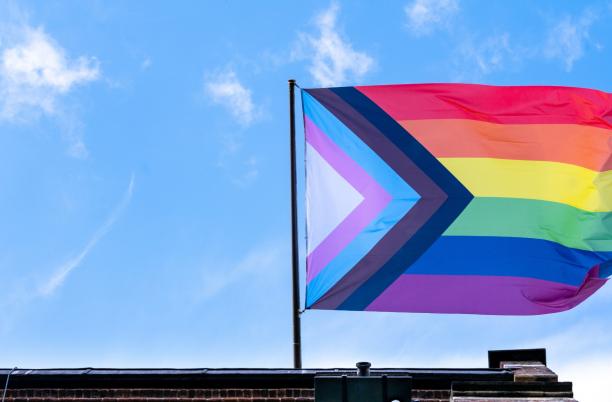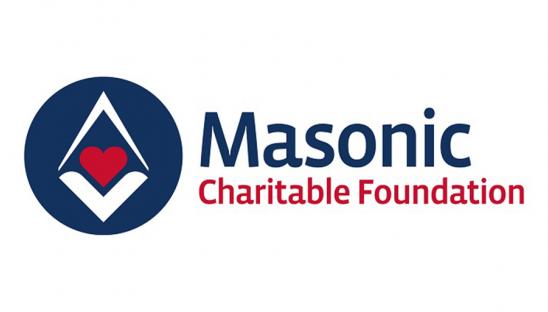
A shared LGBTQ+ Development Facilitator

Three hospices in Cheshire have employed a LGBTQ+ Development Facilitator to help promote LGBTQ+ inclusion.
Title
What's on this page
Project and outcomes
Project overview
St Luke’s Hospice in Cheshire, Hospice of the Good Shepherd, and East Cheshire Hospice were successful in applying for a £22,000 grant from the Masonic Charitable Foundation (MCF), through the Hospice UK Grants Programme.
This funded a 12-month equality, diversity, and inclusion (EDI) programme intended to promote LGBTQ+ inclusion for staff and people receiving care at the hospices.
A crucial part of the programme was to develop an LGBTQ+ Development Facilitator role to work across all three hospices. Ellen Coleman is employed in the role for 2 days per week and spreads her time across the three hospices depending on need and planned project activity.
Outcomes
The three hospices have developed staff training focused on the LGBTQ+ community and end of life care. This revolves largely around 'LGBTQ+ Concepts & Conversations' – learning and understanding useful vocabulary, practising using gender neutral terminology and finding out how to ask questions that people might otherwise avoid. Staff are offered further guidance depending on their role in the hospice. An important aspect of the training is giving staff a safe and supportive platform to “get it wrong” so they can get it right when it really counts.
They updated their Equality, Diversity and Inclusion (EDI) policies to better reflect the needs of the LGBTQ+ community. Updated EDI statements are visibly displayed around the building, which helps make it clear that the hospices are safe spaces for LGBTQ+ people. It also helps make the hospices accountable for delivering the policies.
The hospices are working to make their paperwork and databases are inclusive, for example by making sure questions about gender identity include non-binary options. They need to collect meaningful data so they can analyse the success of their EDI work, but are working to ensure they only ask necessary questions which are phrased in the most sensitive way.
Ellen Coleman has developed an LGBTQ+ focussed “15 step challenge” adapted from the NHS 15 step challenge. This is a toolkit with a series of questions that help staff assess how certain spaces might come across to patients and families. Ellen’s addition to the toolkit allows staff to gain an understanding of how people from the LGBTQ+ community may feel when they visit a hospice. It is a quick and easy way for staff to get an idea of where the hospices are doing well at building an inclusive space and where improvement is needed.
The initial funding for the LGBTQ+ facilitator role ended in October 2022, but the three hospices agreed to fund the project themselves for a further year.
Facilitators, challenges and advice
Key facilitators
Each hospice has appointed LGBTQ+ Champions, who have volunteered for the role and received training. These Champions work across a range of teams and shift patterns spanning the week, helping to raise their colleagues’ awareness about effectively supporting LGBTQ+ patients. This means someone is nearly always on hand to answer any questions and help ensure changes are implemented. The champions also offer meaningful feedback on the project based on their own experiences and expertise.
Ellen has worked to develop good relationships with the LGBTQ+ community, which has helped embed the voices of LGBTQ+ people into the hospices’ work. All three hospices have built connections with Chester Pride.
Working with specialist LGBTQ+ organisations has been very valuable. This was particularly the case when the hospices were seeking advice on providing a trans inclusive service, as the hospices had less knowledge and experience of supporting trans people.
To make sure the new EDI processes worked well when they came into effect, the hospices spent time consulting on, testing and training people about changes to processes. This allowed them to get things wrong behind the scenes and correct any missteps before they affected patients.
Challenges
Preconceived ideas about end of life care can make it difficult to engage with people from the local community. Before being able to get valuable input from LGBTQ+ people, Ellen spends time breaking down barriers caused by misconceptions about end of life care.
Entering into LGBTQ+ spaces can sometimes feel like you are infiltrating someone else’s safe place, especially if you are hoping to gain something from doing so. It’s important to be aware of this and prioritise building good relationships over gathering information.
In staff training, people sometimes worry about causing offence, which can lead to important questions going unasked and unanswered. Ellen and the LGBTQ+ Champions understand that LGBTQ+ issues may be new to some people and encourage them to ask questions. They use analogies to help people think about how to respond to LGBTQ+ issues, for example by drawing parallels with other scenarios people might have experienced.
Tips and advice
Think about which members of staff need to know information about someone’s gender and sexual identity. This can be a very private thing for some people so it should only be disclosed on a need-to-know basis. Don’t cause people stress or discomfort if you don’t have to!
Include people in decisions about their own care where possible. For example, if you’re unsure which gendered ward to put someone on, why not ask them where they’d be most comfortable?
Be mindful of small talk - are you allowing your own biases to sneak in when you’re chatting to patients, carers and families? For example, questions like “do you have a husband?” could be challenging for someone who has a partner of another gender.
Sex and gender are not the same thing, so don’t use the terms interchangeably. Make sure you know the difference and use the terms meaningfully. Think about information you’re asking for on forms and why you need that specific information.
Organisational changes are informed by evidence and data. If your service doesn’t ask about people’s gender or sexual orientation (where appropriate) how can changes reflect the needs of sexual and gender minorities accessing your services?
Giving staff and volunteers a space to get it wrong, ask difficult questions and learn allows them to feel confident in getting it right when it matters most. We don’t always get a second chance.

Acknowledgements
We would like to acknowledge the generous support provided by the Masonic Charitable Foundation through the Hospice UK Grants programme, without which this project would not be possible.
